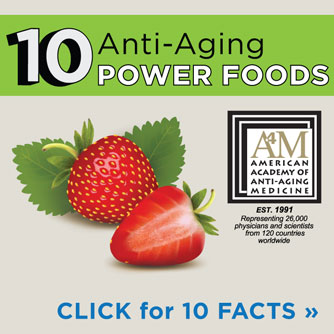Anti-Aging Tip Sheet: Eat to Live
Diets laden with fried and sweet foods, processed and red meats refined grains, and high-fat dairy products reduce a person’s likelihood of achieving older ages in good health and with higher functionality. As such, the Western diet is linked to premature disease and death. Tasnime Akbaraly, from INSERM (France), and colleagues examined whether diet, assessed in midlife, predicts future aging and disease. The team used the Alternative Healthy Eating Index (AHEI), an index of diet quality, originally designed to provide dietary guidelines with the specific intention to combat major chronic conditions such as cardiovascular diseases and diabetes. The researchers assessed data drawn from the British Whitehall II cohort study involving 5,350 adults (average age 51.3 years). They found that following the AHEI can double the odds of reversing metabolic syndrome, a condition known to be a strong predictor of heart disease and mortality. Conversely, the team determined that participants with low adherence to the AHEI increased their risk of cardiovascular and noncardiovascular death. Those who followed a “Western-type diet” consisting of fried and sweet food, processed food and red meat, refined grains, and high-fat dairy products lowered their chances for ideal aging. The study authors conclude that: “By considering healthy aging as a composite of cardiovascular, metabolic, musculoskeletal, respiratory, mental, and cognitive function, the present study offers a new perspective on the impact of diet on aging phenotypes.” [Tasnime Akbaraly, Séverine Sabia, Gareth Hagger-Johnson, Adam G. Tabak, et al. “Does Overall Diet in Midlife Predict Future Aging Phenotypes? A Cohort Study.” American Journal of Medicine, Vol. 126, Issue 5, Pages 411-419.e3; May 2013.] Conversely – and fortunately, a healthy diet promotes healthy aging. Cecilia Samieri, from INSERM (France), and colleagues studied data involving 10,670 women, median age 59 years at the study’s start, who were enrolled in the Nurses’ Health Study. The researchers followed the study subjects for upwards of 15 years, tracking dietary habits and how well each subject aged – healthy aging was defined as having no major chronic diseases, physical impairment, our mental or cognitive issues. In that definition, the team found that 11% of the women were healthy agers, with the rest aging normally. Healthy agers were found to consume a diet following the Mediterranean (abundant in fruits and vegetables) or DASH (low-salt) guidelines. The study authors conclude that: “Better diet quality at midlife seems to be strongly linked to greater health and well-being in persons surviving to older ages.” [Samieri C, Sun Q, Townsend MK, Chiuve SE, Okereke OI, Willett WC, Stampfer M, Grodstein F. “The association between dietary patterns at midlife and health in aging: an observational study.” Ann Intern Med. 2013 Nov 5;159(9):584-91.] As well, a better diet helps to improve Quality of Life. Older men and women who follow healthy eating guidelines tend to maintain the capacity for independent living. Bamini Gopinath, from the University of Sydney (Australia), and colleagues studied data collected on 1,305 men and women, ages 55 years and older, who were enrolled in a large Australian study of common eye diseases and general health. Participants filled out questionnaires about what they ate and how often in 1992 to 1994. Researchers scored each person’s diet on a scale from 0 to 20 based the Australian Guide to Healthy Eating. Higher scores indicated better diets. The one-quarter of participants with the highest-quality diets had scores above 11.1. The one-quarter with the poorest diets scored 8.1 and below. Five and ten years after reporting on their diets, subjects completed surveys assessing their quality of life with regard to physical health, mental health, social functioning and vitality. Each area was measured on a scale of 0 to 100. On average, participants with the highest diet scores also reported a better quality of life. The team observed that physical function was almost six points higher among the healthiest eaters than the least healthy. As well, general health was four points higher among healthy eaters and vitality was five points higher. The study authors conclude that: “Higher diet quality was prospectively associated with better quality of life and functional ability.” [Gopinath B, Russell J, Flood VM, Burlutsky G, Mitchell P. “Adherence to Dietary Guidelines Positively Affects Quality of Life and Functional Status of Older Adults.” J Acad Nutr Diet. 2013 Nov 14.] VIEW our 10 Anti-Aging Power Foods and Eat for Life!

Comments are closed for this article!